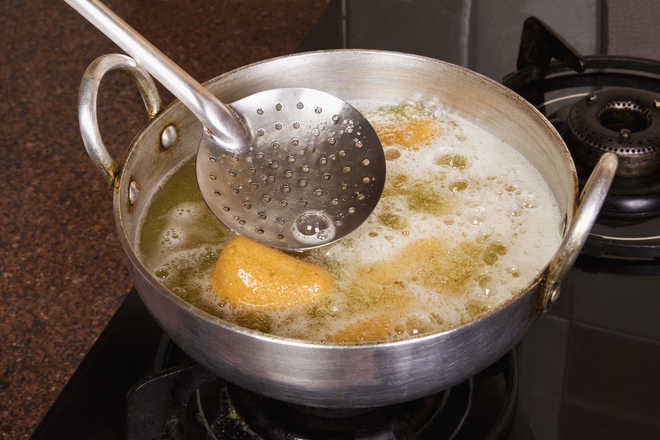Health, Food Safety wings to collect samples, convince food outlets on need for curbs in trans fatty acids
The Health Department and the Food Safety wing are joining hands to launch an initiative to enforce dietary guidelines, involving the reduction of trans fatty acids (TFAs), salt and sugar in commercially available foods in the State.
The initiative, with technical support from the World Bank, WHO and the Food Safety and Standards Authority of India (FSSAI), is being launched as unhealthy diet is pushing up metabolic syndrome and premature deaths due to non-communicable diseases (NCDs) among Keralites.
Latest estimates put the prevalence of metabolic syndrome (MS) in Keralabetween 24-33%, indicating that one in three or four persons — predominantly women — have this condition.
Metabolic syndrome (MS) is a cluster of metabolic abnormalities — high blood pressure, high blood sugar, abdominal obesity, abnormal cholesterol or triglyceride levels — that occur together, raising risk of heart disease, stroke and diabetes.
“A striking factor in Kerala is the high level of hypertriglyceridemia (elevated triglycerides in blood), at 45%, indicative of a dietary pattern high in fats and carbohydrates. We require serious interventions in dietary changes to reduce our burden of NCDs,” said P.S. Indu, Head of Community Medicine, Thiruvananthapuram Government Medical College.
Literature says that TFAs have “a unique cardio metabolic imprint that is linked to insulin-resistance and metabolic-syndrome pathways” and that consumption of even small amounts of TFAs is associated with an increase in the incidence of coronary heart disease.
Main contributors
“The high content of industrial TFAs and salt in baked goods, fried chicken, or banana chips joints in the State is contributing to this epidemic of MS in Kerala. Enforcing the current regulation on the content of industrial TFAs in can bring in significant benefits,” Dr. Indu said.
WHO recommends that trans fat intake be limited to less than 1% of total energy intake and has called for the total elimination of TFAs in global food supply by 2023. FSSAI has proposed to limit TFA limit in foods to 2% and eliminate trans fats from foods by 2022.
“Enforcing the current FSSAI legislation limiting TFAs at 5% is the need of the hour. Denmark pioneered trans fat ban in 2003 and in three years, their CVD mortality rates plummeted. From an annual mean death of 441.5 per one lakh it dropped by 14.2 deaths per one lakh per year (ie 750 fewer deaths every year). Food industry players and the unorganised food sector should be persuaded to switch to commercially viable alternatives to TFAs,” Eram S. Rao, Senior Nutrition Specialist, World Bank, who was in the city as part of the technical support team, said.
“We will collect information on the TFA and sodium content in a range of commonly consumed food items in Kerala. This information is vital if we are to convince the industry and the unorganised sector about the need to reduce harmful TFA content in food,” a Health official said.
The State Food Safety wing will now embark on a sample study across the State, collecting at least 300 samples of popular food items from the market and testing the TFA content. We do have gas chromatographs in three of our laboratories and additionally,we have the funds to send samples to any other lab for testing,” K. Anilkumar, Joint Commissioner of Food Safety said.
The Health Department hopes that once it has the baseline information, it can convince the food industry players and the unorganised food sector about the need to keep TFA levels within legal limits. Awareness campaigns targeting the public and advocacy will follow.
